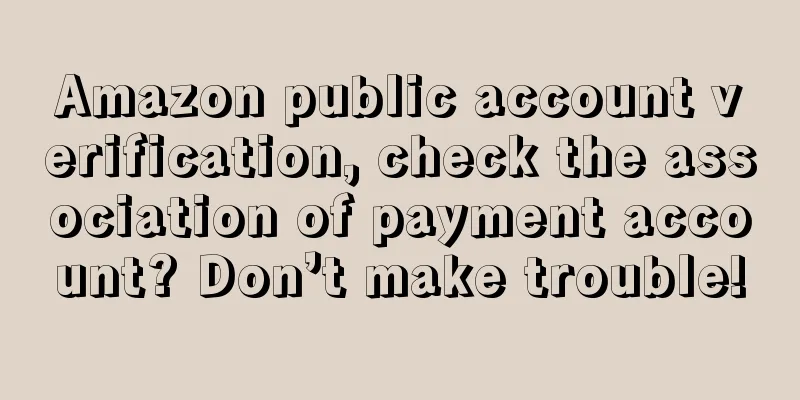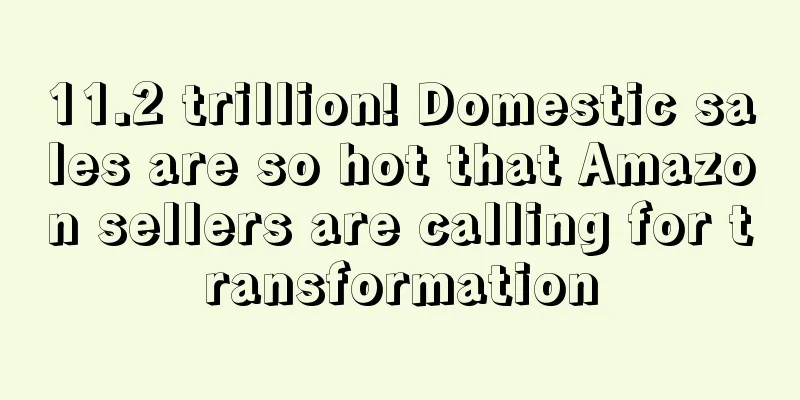Amazon public account verification, check the association of payment account? Don’t make trouble!

|
Amazon's account ban wave is still continuing, and the wave of account association is sweeping in again. Rumor has it that Amazon will use the payment account to check the associated stores, which instantly panicked a large number of sellers.
In addition to the association, some sellers have received news that all Amazon stores registered with Chinese information must undergo public account verification. Without a public account, funds may be frozen.
What is the truth behind the association of payment accounts and public account verification?
Amazon is taking action against multiple stores using the same payment account? The truth is ...
Yesterday, a picture went viral in the Amazon seller circle. The content roughly mentioned: Amazon requires payment platforms to provide seller information to check account associations. The sellers who broke the news have received a call from a payment service provider and must provide it before the end of July.
Many sellers panicked when they saw the related information check. One seller asked: Is Amazon really going to take action against sellers who use the same payment account for several stores?
It is understood that many sellers use one payment account to correspond to more than one store. If this is checked, how many stores will be closed? It’s scary to think about it!
Why did this trigger speculation among sellers? First, the recent account association and blocking have made a group of sellers frightened, and everyone is really afraid that there will be problems with their accounts; second, an announcement previously issued by Amazon mentioned that payment service providers participating in the program will also share information about your identity and payment service provider account with Amazon.
The statement in Amazon’s announcement that service providers will share seller information with Amazon is really terrifying when you think about it carefully!
Are service providers willing to provide information to check for associations? Isn't this "selling out customer information"? Service providers are definitely not willing to do so. Some whistleblower sellers also mentioned that service providers are trying to avoid this problem.
However, an industry insider said that if the service provider does not share information, it may be kicked off the list of payment providers, and it is difficult to say.
As for the rumor in the picture, there has been no official response from the service provider involved. The editor consulted its staff and the reply was that they were not clear about the specific situation.
One seller said that he could not stand the rumors and asked two managers of the service provider, and both said that they had not received the shared documents.
It is impossible to find associations through shared information
Amazon migrant workers, a seller in the industry, believe that it is impossible for Amazon to obtain the information of the owner of the payment account from the payment service provider.
So many sellers open one account and apply for multiple bank accounts, which are used in different Amazon accounts. How can an American company ask a Chinese company for customer privacy if they want to target sellers through the registration information of the payment account? The payment service provider sequence includes not only third-party payment service providers, but also domestic banks, and the state is in charge of supervision behind the scenes.
Amazon can only obtain sales data, not some customer privacy information.
Other sellers have the same view: checking customer information through a third-party payment service provider involves privacy information across borders, and it is not so easy to get it. Amazon does not need to do that at all. If a large number of accounts are shut down , the platform's revenue will also decrease, which is not good for anyone.
Amazon seller Wuye said that regarding the data sharing terms in the service provider plan, the payment account is linked, unless the seller fills in the duplicate link himself. Otherwise, I think Amazon cannot check the account information status inside the payment platform. If it really needs to be opened independently, the payment platform will also come up with a plan and submit the information of each account to us. Do n't be too anxious.
The matter involves payment service providers. The editor interviewed several service providers, and they all said that they had not received any documents requiring them to share seller information with the platform.
It is even more impossible to check the association by sharing the seller information. Moons, the Yijing payment recipient, mentioned:
First, no payment company has received any notification asking for the materials in the screenshots. Secondly, different people sent different screenshots, but none of them actually sent out the files. Just WeChat screenshots have no other effect except to create panic. Thirdly, it is impossible for payment companies not to know the impact of account association. If they really want to check the association of accounts with the same name, it will affect merchants who have opened multiple accounts with the same name. Finally, from the perspective of technical feasibility, if Amazon really wants to check the connection from the payment account, it means collecting the information of all service providers currently participating in PSPP and analyzing the seller information. There are many issues involved in this process, such as the confidentiality of user information, the independence of information between different companies, and the problem of duplicate registration between different payment companies.
Therefore, Amazon sellers do not need to worry, just make products with heart and sell them well! While the collection account association caused panic, the news that Amazon will conduct public account verification also touched the nerves of sellers.
Will Amazon conduct public account verification?
In June, there were rumors that Amazon would conduct public account verification, but the rumors were mixed and did not attract much attention. Yesterday, a screenshot of a group chat went viral in the circle, once again claiming that Amazon would conduct public account verification for Chinese stores before receiving payments, which caused an uproar for a while.
In the online news, someone claimed to have received a message from the Chinese high-level officials, "Now all payments received by stores with Chinese information must be verified by public accounts. You submit your bank account to Amazon, which corresponds to your business license, and Amazon will transfer a few tenths of US dollars to you. After receiving it, tell Amazon, and the platform will transfer the money to the payment method you have bound. It is okay to receive payments in the wrong name, but the bank public account must be verified. In other words, if your store cannot find the legal person, it is completely dead and the money is gone."
The source said with certainty: "It will be implemented in August. Before the payment is received, Amazon will send you an email asking you to submit a public bank account. The public bank account must be held by a legal person, but a considerable number of Chinese sellers cannot find the contact information of the legal person on their business license."
When the news came out, there was an uproar among the sellers.
It is not difficult to understand why sellers are panicking. Since the beginning of this year, Amazon has gradually implemented video verification, address verification and other methods to verify the identity of sellers. In addition, in the past two months, many big sellers have been blocked one after another. When the Amazon system crashed yesterday, many sellers’ first reaction was “It’s over, my account has been scanned.” In the state of a frightened bird, it is inevitable that they will believe everything they hear.
"It's too deceptive, isn't it? What about those who register on behalf of others? Won't the purchased accounts be useless?" "If you collect payments from public accounts, 99% of the accounts will be dead." "The news is true. I heard about it in March. It probably means legal procurement, legal production, legal tax payment and tax refund." The sellers were talking about it.
Is the news true? Amazon has not responded to this, and most sellers believe it is a rumor.
First, yesterday afternoon, at least three versions of the screenshots that were exactly the same as the above rumor were circulating, but the WeChat avatars and names were different, so it is not difficult to imagine that there might be something fishy going on. "I heard that it was a smokescreen released by the service provider," said a seller.
Secondly, analyze the feasibility. A seller analyzed: Amazon verifies the company's bank account? Now if the office address is inconsistent with the registered address, it is impossible to apply for a public bank account. Bank staff will come to verify the office address. If they find that it is inconsistent, they will not issue a public account. Amazon's public transfer requires a large fee, what's the point? Verifying the seller's public account does not benefit Amazon in any way, because it is impossible for Amazon to transfer foreign exchange to China, and it is completely unnecessary.
Furthermore, some sellers have confirmed with Amazon, "Amazon's payment manager has clearly stated that this does not happen", "I just asked the Amazon manager, and it's not true."
Why is the requirement for public accounts almost equivalent to a ban order?
1. There is a limit on the number of public accounts.
According to the encyclopedia, public accounts refer to basic accounts, general accounts, temporary accounts and special accounts. The People's Bank of China's account management regulations : an enterprise can only open one basic account, but can open multiple general accounts. If you also need to open an account for withdrawals, and the funds have a certain special use, then you can apply for a special account at the bank to withdraw money.
Second, there is a certain threshold. One seller said: "Many of them are registered addresses, and banks will not open public accounts. I went to the bank to open an account, but the bank said I couldn't open one because I didn't have a real address." Another seller also said "I can't afford it."
Third, and this is also a big problem faced by many e-commerce sellers, the account registration information is not their own. To open a public account, you need the legal person's ID card, power of attorney, business license and other materials. This is an extremely strict restriction for accounts purchased or opened using other people's information.
This is one of the reasons why sellers have such a huge reaction to this. However, no matter what the platform dynamics are, compliance operations are still the top priority for sellers. Amazon's account ban wave is still continuing, and the wave of account association is sweeping in again. Rumor has it that Amazon will use the payment account to check the associated stores, which instantly panicked a large number of sellers.
In addition to the association, some sellers have received news that all Amazon stores registered with Chinese information must undergo public account verification. Without a public account, funds may be frozen.
What is the truth behind the association of payment accounts and public account verification?
Amazon is taking action against multiple stores using the same payment account? The truth is ...
Yesterday, a picture went viral in the Amazon seller circle. The content roughly mentioned: Amazon requires payment platforms to provide seller information to check account associations. The sellers who broke the news have received a call from a payment service provider and must provide it before the end of July.
Many sellers panicked when they saw the related information check. One seller asked: Is Amazon really going to take action against sellers who use the same payment account for several stores?
It is understood that many sellers use one payment account to correspond to more than one store. If this is checked, how many stores will be closed? It’s scary to think about it!
Why did this trigger speculation among sellers? First, the recent account association and blocking have made a group of sellers frightened, and everyone is really afraid that there will be problems with their accounts; second, an announcement previously issued by Amazon mentioned that payment service providers participating in the program will also share information about your identity and payment service provider account with Amazon.
The statement in Amazon’s announcement that service providers will share seller information with Amazon is really terrifying when you think about it carefully!
Are service providers willing to provide information to check for associations? Isn't this "selling out customer information"? Service providers are definitely not willing to do so. Some whistleblower sellers also mentioned that service providers are trying to avoid this problem.
However, an industry insider said that if the service provider does not share information, it may be kicked off the list of payment providers, and it is difficult to say.
As for the rumor in the picture, there has been no official response from the service provider involved. The editor consulted its staff and the reply was that they were not clear about the specific situation.
One seller said that he could not stand the rumors and asked two managers of the service provider, and both said that they had not received the shared documents.
It is impossible to find associations through shared information
Amazon migrant workers, a seller in the industry, believe that it is impossible for Amazon to obtain the information of the owner of the payment account from the payment service provider.
So many sellers open one account and apply for multiple bank accounts, which are used in different Amazon accounts. How can an American company ask a Chinese company for customer privacy if they want to target sellers through the registration information of the payment account? The payment service provider sequence includes not only third-party payment service providers, but also domestic banks, and the state is in charge of supervision behind the scenes.
Amazon can only obtain sales data, not some customer privacy information.
Other sellers have the same view: checking customer information through a third-party payment service provider involves privacy information across borders, and it is not so easy to get it. Amazon does not need to do that at all. If a large number of accounts are shut down , the platform's revenue will also decrease, which is not good for anyone.
Amazon seller Wuye said that regarding the data sharing terms in the service provider plan, the payment account is linked, unless the seller fills in the duplicate link himself. Otherwise, I think Amazon cannot check the account information status inside the payment platform. If it really needs to be opened independently, the payment platform will also come up with a plan and submit the information of each account to us. Do n't be too anxious.
The matter involves payment service providers. The editor interviewed several service providers, and they all said that they had not received any documents requiring them to share seller information with the platform.
It is even more impossible to check the association by sharing the seller information. Moons, the Yijing payment recipient, mentioned:
First, no payment company has received any notification asking for the materials in the screenshots. Secondly, different people sent different screenshots, but none of them actually sent out the files. Just WeChat screenshots have no other effect except to create panic. Thirdly, it is impossible for payment companies not to know the impact of account association. If they really want to check the association of accounts with the same name, it will affect merchants who have opened multiple accounts with the same name. Finally, from the perspective of technical feasibility, if Amazon really wants to check the connection from the payment account, it means collecting the information of all service providers currently participating in PSPP and analyzing the seller information. There are many issues involved in this process, such as the confidentiality of user information, the independence of information between different companies, and the problem of duplicate registration between different payment companies.
Therefore, Amazon sellers do not need to worry, just make products with heart and sell them well! While the collection account association caused panic, the news that Amazon will conduct public account verification also touched the nerves of sellers.
Will Amazon conduct public account verification?
In June, there were rumors that Amazon would conduct public account verification, but the rumors were mixed and did not attract much attention. Yesterday, a screenshot of a group chat went viral in the circle, once again claiming that Amazon would conduct public account verification for Chinese stores before receiving payments, which caused an uproar for a while.
In the online news, someone claimed to have received a message from the Chinese high-level officials, "Now all payments received by stores with Chinese information must be verified by public accounts. You submit your bank account to Amazon, which corresponds to your business license, and Amazon will transfer a few tenths of US dollars to you. After receiving it, tell Amazon, and the platform will transfer the money to the payment method you have bound. It is okay to receive payments in the wrong name, but the bank public account must be verified. In other words, if your store cannot find the legal person, it is completely dead and the money is gone."
The source said with certainty: "It will be implemented in August. Before the payment is received, Amazon will send you an email asking you to submit a public bank account. The public bank account must be held by a legal person, but a considerable number of Chinese sellers cannot find the contact information of the legal person on their business license."
When the news came out, there was an uproar among the sellers.
It is not difficult to understand why sellers are panicking. Since the beginning of this year, Amazon has gradually implemented video verification, address verification and other methods to verify the identity of sellers. In addition, in the past two months, many big sellers have been blocked one after another. When the Amazon system crashed yesterday, many sellers’ first reaction was “It’s over, my account has been scanned.” In the state of a frightened bird, it is inevitable that they will believe everything they hear.
"It's too deceptive, isn't it? What about those who register on behalf of others? Won't the purchased accounts be useless?" "If you collect payments from public accounts, 99% of the accounts will be dead." "The news is true. I heard about it in March. It probably means legal procurement, legal production, legal tax payment and tax refund." The sellers were talking about it.
Is the news true? Amazon has not responded to this, and most sellers believe it is a rumor.
First, yesterday afternoon, at least three versions of the screenshots that were exactly the same as the above rumor were circulating, but the WeChat avatars and names were different, so it is not difficult to imagine that there might be something fishy going on. "I heard that it was a smokescreen released by the service provider," said a seller.
Secondly, analyze the feasibility. A seller analyzed: Amazon verifies the company's bank account? Now if the office address is inconsistent with the registered address, it is impossible to apply for a public bank account. Bank staff will come to verify the office address. If they find that it is inconsistent, they will not issue a public account. Amazon's public transfer requires a large fee, what's the point? Verifying the seller's public account does not benefit Amazon in any way, because it is impossible for Amazon to transfer foreign exchange to China, and it is completely unnecessary.
Furthermore, some sellers have confirmed with Amazon, "Amazon's payment manager has clearly stated that this does not happen", "I just asked the Amazon manager, and it's not true."
Why is the requirement for public accounts almost equivalent to a ban order?
1. There is a limit on the number of public accounts.
According to the encyclopedia, public accounts refer to basic accounts, general accounts, temporary accounts and special accounts. The People's Bank of China's account management regulations : an enterprise can only open one basic account, but can open multiple general accounts. If you also need to open an account for withdrawals, and the funds have a certain special use, then you can apply for a special account at the bank to withdraw money.
Second, there is a certain threshold. One seller said: "Many of them are registered addresses, and banks will not open public accounts. I went to the bank to open an account, but the bank said I couldn't open one because I didn't have a real address." Another seller also said "I can't afford it."
Third, and this is also a big problem faced by many e-commerce sellers, the account registration information is not their own. To open a public account, you need the legal person's ID card, power of attorney, business license and other materials. This is an extremely strict restriction for accounts purchased or opened using other people's information.
This is one of the reasons why sellers have such a huge reaction to this. However, no matter what the platform dynamics are, compliance operations are still the primary principle for sellers. |
<<: E-commerce grew 30%, and these products were the hottest selling in the United States in 2020
>>: Amazon Canada cancels Prime Day
Recommend
A new round of strikes at the Royal Mail is coming
It is reported that the Royal Mail will start a n...
What is Yuanchuang Patent Trademark? Yuanchuang Patent Trademark Review, Features
Yuanchuang Patents and Trademarks has long been f...
Package theft surges in the US, implicates Amazon, Target and other retailers
The theft of express packages from Amazon and UPS...
What is Chaofeng International? Chaofeng International Review, Features
Chaofeng International (Shenzhen Chaofeng Interna...
Want to have beautiful hair? Go to TikTok!
On the TikTok platform, the reasons for the popul...
Delay warning! German railway strikes again
The strike started at 5 pm on September 1 and end...
Job hunting surges amid account bans, Amazon's base salary drops by 30%
Under Amazon's rectification, the industry be...
After being complained of infringement, Amazon seller deleted the product, which resulted in the goods being seized!
Recently, the editor learned from the official Am...
What is Senjietong Supply Chain? Senjietong Supply Chain Review, Features
Senjietong Supply Chain (Senjietong Supply Chain C...
What is CONSOB? CONSOB Review, Features
<span data-docs-delta="[[20,{"gallery"...
Amazon plans to launch its own independent website to challenge Shopify
Amazon plans to build its own independent website...
What is Touchengbao? Touchengbao Review, Features
Touchengbao is a software specifically designed t...
What is HEINZ? HEINZ Review, Features
HEINZ Gets It Right with Heinz No Added Sugar Ket...
As the official partner of the European Cup, WorldFirst launches exclusive zero-fee benefits on Amazon Europe!
As the official global partner of the 2020 Europe...
What is Best Match? Best Match Review, Features
Best Match is a default search result sorting met...









